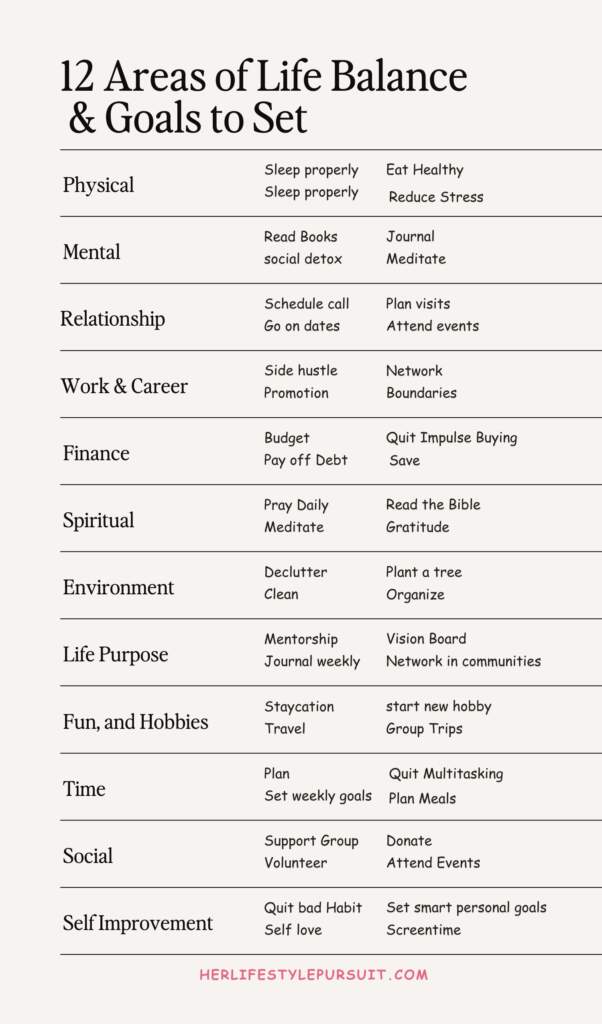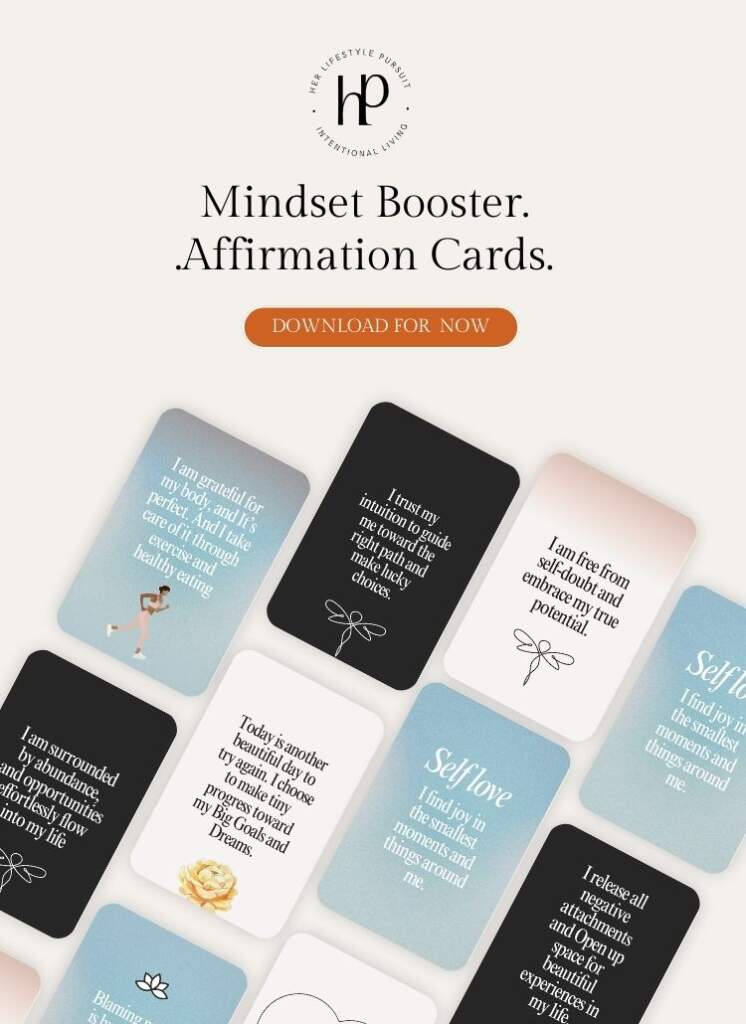Struggling to get your life together? Here’s an ultimate guide on the 12 areas of life balance and how to use this concept to set goals to improve your life.

What are the areas of life to set goals? How does each area of life affect the quality of your life, and sometimes, why do things feel like they are out of control? And other times, you think you have everything together.
The answer is balancing each areas of life. Everyone desires to be better and improve their lives.
Often, the first thing that comes to mind is setting new goals. Or making a list of new habits and resolutions that you may never keep.
But the truth is, to experience growth without feeling like a part of your life is suffering — identifying and balancing each area of your life is essential.
For instance, imagine a workaholic who wakes up in the morning to the blaring sound of an alarm, showers, and rushes off to work without sparing at least five minutes to slow down and breathe.
She rushes to work, chasing financial and career growth, returns home at night, and eats junk for dinner without managing other aspects of life.
What do you think will happen in the end? Her health, relationship, social life, physical, emotional, and mental health will take a hit.
Conversely, creating an excellent daily routine and setting goals that help you balance each area of your life will lead to a better and healthier lifestyle.
You may wonder, Faith, is this realistic?
I know this already seems daunting, but I promise you it’s not. The goal is not to invest equal attention to each area of our lives.
It’s impossible, realistically, since you may have different overhead goals you’re chasing at a time. The goal is to balance areas of life and thrive better.
After reading this blog post, you’ll understand the 4 main categories and 12 areas of life and examples of goals to set for a balanced life.

Area of Life Meaning
Areas of life are the different aspects of a person’s life, such as health, finances, career, relationships, environment, emotional wellness, spirituality, self-improvement, and self-care, etc that contribute to overall wellbeing, happiness, satisfaction, and life.
Each area of life is looped together and influences one another.
How you handle each of the areas of your life will reflect in the overall quality of your life.
For example, if you focus solely on nurturing your relationships without practicing self-care.
Soon, you’ll feel burnt out and probably lose yourself, since you spend most of your time tending to other people’s needs.
In the same way, if you focus on pursuing your career growth without balancing other aspects of your life, stress will soon kick in, and like Rina Raphael, you’ll eventually need to pause and seek help.
Hence, we seek to balance the areas of life and set goals that help us grow without letting go of other aspects of our lives.
Please note that we are different and have different priorities at other times, so this is a guide to help you define what’s important to you.
Set aside time to review, reflect, and map out the core areas of your life that you’ll give more attention to and the areas that require less attention to achieve your overall goal.
Every quarter of the year, I define what growth means for me.
Now that we have these out of the way, let’s dig in.
The 12 areas of your can be divided into 4 categories of life or realms, which include your;
- Health
- People/connections
- Growth
- Environment
These categories of life are essential to create a balanced life that allows us to thrive.

12 Areas of Life Balance with Examples of Goals to Set
So, for each part of life, we’ll share goals that allow you to aim for a balanced life.
1. Physical Wellbeing
Your physical well-being is a cornerstone of living a balanced life. The physical aspects of your life include your health, fitness, self and body care, etc.
When your body is healthy, you’ll have the vitality to pursue your goals and financial stability, be in relationships, and enjoy life to the fullest.
Suffix it to say that your physical well-being ripples into your mental, emotional, relationship, and social life.
For example, if you feel uncomfortable about your body, you may never fully accept compliments when people give them to you.
How you see and love yourself also affects the quality of your relationship with others.
Hence, you should prioritize taking care of your body, eating healthy foods, exercising, and engaging in nourishing activities that help you stay healthy, happy, and confident in your body.
To achieve balance in the physical area of life, set intentional goals and accomplish them.
Some Goals example to set for the Physical Area of Life;
- Get 7–9 hours of quality sleep every night.
- Loose X amount of weight
- Gain X amount of weight if you’re underweight.
- Eat home-cooked meals.
- Drink more water daily.
- Take at least 5,000 steps daily
- Exercise at least 3 times weekly
- Go for regular checkups
- Do one self-care activity to promote self-love weekly
- Quit taking alcohol
- Reduce stress
- Create a bedtime routine that fosters wellness
- Quit consuming soda
- Limit processed foods, sugar, etc.
- Pamper yourself at least once a week.
- Schedule time to relax daily.
So, these are some goals examples for the physical area of life, feel free to customize it to suit your needs.

2. Emotional and Mental
In the same way, our physical well-being is the cornerstone of balancing our lives.
Our emotions deeply affect how we react, go about our day, and even our zeal to tackle other areas of life.
Sadly, many people only focus on physical looks, such as having a beautiful body, glowing up, eating right, and achieving their big goals.
While paying little attention to training and feeding their mind rightly.
Your mental wellbeing impacts how you think, feel, and act, influencing your ability to cope with stress, navigate challenges, and build relationships with others.
I digress a bit. Have you ever felt so down emotionally that you’re not able to take any steps forward?
Sometimes, you may notice you’re procrastinating on important tasks because you lack the zeal to handle them.
Soon you’ll feel burnt out, down, and stuck in a funk, and depressing thoughts start creeping in. This is because the mind is the bedrock of our being.
Everything happens in the mind. If you want to succeed at what you do, you must first cultivate a positive mindset.
Conversely, if you want to maintain a healthy body, you need to think and act like a healthy person.
Hence, setting good mental goals and caring for your mental wellbeing is vital in balancing areas of life.
If you struggle with your mental health, the first thing to do is identify why you always feel that way and seek professional help.
Journaling your thoughts, practicing positive affirmations, and reading the right books can also help you feel better.
But the truth is that as humans, we’re bound to have our highs and lows, so if you’re struggling with mental wellbeing right now, know it’s normal and seek solutions. Set mental goals that can help you thrive better.
Here are Some Examples of Goals for Mental Wellbeing.
- Go for walks in nature
- Read a book for at least 30 minutes daily
- Do a social media detox
- Unfollow all accounts that affect you negatively.
- Add meditation to your daily routine
- Practice self-care daily
- Go for therapy
- Build healthy relationships that support you.
- Declutter negative friendships
- Eat mindfully
- Do a 30-days gratitude challenge
- Journal daily for 30 days.
- Include affirmations into your daily routine.
- Join “good” wellness clubs.

3. Relationships
Being surrounded by technology makes stepping out and building meaningful connections difficult.
For some, their routine involves “gadgets” and nothing more!
While for some, they’re never intentional about their relationship.
The truth is that the people in your life affect the quality of your life. This is why you should be intentional about cultivating healthy relationships.
When you focus on building meaningful, healthy relationships, you build your tribe of support systems, those who genuinely care about you and root for you.
Meanwhile, toxic and strained relationships drain energy, cause stress and anxiety, and hinder personal growth.
As you step out of your comfort zone and make beautiful connections.
Remember to evaluate them, guard your heart jealously, and only let in the right people.
I’m not a social butterfly; I prefer quality to quantity.
I intentionally maintain my relationships by being present in the lives of those I love, showing appreciation, setting a clear boundary, and unendingly expressing how I feel about them.
Setting clear relationship goals can help you prioritize and strengthen your relationships.
Here are some Goals Examples for the Relationship Area of Life;
- Go on group travels
- Schedule call time
- Plan visiting days
- Go out regularly and meet new people
- Host dinners
- Practice actively listening.
- Be open to discussing unpleasant situations
- Attend game nights
- Join clubs and hobby groups
- Surprise your partner.
- Go on spontaneous dates.
- Set clear boundaries.
- Learn to say No when uncomfortable.
- Practice more kindness.
- Extend compassion to yourself and your loved ones.

4. Work and Career
Do you have a life outside of your work at the moment? What career and work goals are you setting? How do your job and career affect other areas of life?
If you feel like your career is taking the full front of your life, you’re not alone!
Our careers, achievements, and professional pursuits bring a sense of fulfillment and ripple into other areas of life such as finances, health, mental wellbeing, and even our relationships.
As someone who works from home, I spend 60% of my day at work.
This is because I have a big goal to hit, and this percentage is bound to change in a few months.
You may be seeking career advancement, promotions, a new job, or a new degree.
Whichever you’re chasing right now, it’s important to set SMART goals and a plan of action daily and make progress towards achieving that goal, no matter how small the steps may seem.
Make your career goals clear and set milestones to strive towards, ensuring a sense of purpose and progression.
Also, balance work, career, and other aspects of life — value what’s important, set healthy boundaries at work, and make time for your relationships and happiness.
Here are some Career Goals to Set to Balance Areas of Life
- Get a promotion
- Get a salary raise at work
- Start a side hustle
- Separate work life from home life.
- Learn a new skill
- Join networking groups
- Attend workshops and events
- Be a mentee
- Become a mentor
- Change career path
- Schedule fun activities with loved ones outside of work.
- Learn to set boundaries
- Hit a new milestone.

5. Finance
Money is a key part of our life, mostly people mismanage this life area.
If you fail to make good financial decisions and build a healthy financial life, you’ll always be stressed about money and debt, unhappy, and your mental health may suffer.
“Money doesn’t buy happiness,” but creates the flexibility to pursue happiness.
Therefore, setting reasonable financial goals is essential for balancing your life.
First, start by looking at your income, evaluating it, and tracking where your money goes.
You can only make numbers-driven financial decisions and goals once you know how you spend each cent.
Create a clear financial road map, set long and short-term financial goals and milestones, invest, save, quit borrowing (it’s like taking from your future to save the past), and resist impulse buying.
Before you buy something, ask yourself, “Do I need this?”
Sit on the idea for a few days before making that purchase.
If you always buy things without planning, sooner or later, clutter and stuff you don’t need.
Hence, set clear and achievable financial goals for balance and wellness.
Below are Examples of Goals for the Financial Area of life
- Use the 50-30-20 budgeting rule
- Pay off debts
- Live credit free lifestyle
- Start a side hustle
- Freelance
- Start a new business
- Create pension funds
- Set an emergency fund
- Quit impulse buying
- Save for big purchases.

6. Spiritual
Spirituality is an important aspect of life that shouldn’t be neglected, but somehow, we fail to take this part of our lives as seriously as we take others, like gathering wealth, being well, and eating right.
Cultivating a balanced spiritual life provides a sense of meaning, purpose, and connection to something greater than yourself.
For instance, as a Christian, building a consistent prayer life where I read my Bible and pray daily can be challenging.
However, setting small goals, like reading one verse daily and praying with others during morning devotions, helps me immensely.
Your spiritual beliefs reflect your values and practices, interactions with others (relationships), and overall approach to life — they are holistic.
It also gives a sense of your identity, peace, support, and community.
If we’re being honest, spirituality is more than meditation daily, practicing yoga, and praying. It connects deeply to our soul and our sense of existence.
Admittedly, everyone’s spiritual journey is unique and personal, so don’t feel pressured, especially if you’re new to this aspect of life.
By setting clear and meaningful spiritual goals, you can deepen your connection with your inner self, others, and the greater universe.
Here are examples of goals to set for the Spiritual area of life
- Meditating for at least 10 minutes daily
- Praying daily — morning (at the start and end of the day)
- Practice gratitude mindset
- Reading the bible daily
- Attending spiritual events and joining communities that foster your faith.
- Journal daily about your spiritual journey
- Say good faith-based positive affirmations daily to help you grow spiritually.
- Practice random acts of kindness daily
- Read a chapter from a spiritual book daily
- Volunteer in communities around you.
- Listen to Faith-based teaching and podcasts daily.
7. Environment
Our environment plays a vital role in balancing our lives.
Your environment influences how you think, react, and respond to changes, challenges, daily routine, and even your quality of life.
For instance, comparing living in a bustling city like New York to spending time in Bali. Bali is ideal for someone seeking a calmer lifestyle, slow living, spirituality, and wellness.
Although “both worlds” are great in their right.
Living in Bali feels like a constant vacation!
There is greenery, beautiful beaches, more self-care and wellness activities like hiking, yoga, healthy diets, and a strong sense of spiritual community.
Your environment significantly influences how you live and your total well-being. I’m not saying you should pack your bags and leave your city.
However, you’ll be amazed how intentionally making minor changes in your environment affects your overall well-being.
Kindly note that you don’t need to do something grand. You can begin with your office and home — declutter, and organize your entire life to reflect a wellness-conscious lifestyle
Use houseplants to decorate and bring a touch of nature into your home.
Choose plants with a pleasant smell, like Jasmine. Not only does this add fragrance to your space, but it also improves air quality.
Take intentional steps such as reducing your carbon footprint, using eco-friendly products, conserving energy and resources, and setting up your surroundings to become a sanctuary that protects your body and mind.
Even little changes, like the color of the wall, the choice of floor, bed, and the aesthetics of your apartment, play a role in your mood and overall comfort at home — sharing this is from my experience.
Earlier this year, my apartment started making me feel stuffy, and I’ll tell you for a fact, it wasn’t cluttered.
After much consideration, I repainted the wall. Switching from a darker color to white instantly made my home feel warmer, brighter, and more spacious.
Our environment affects our mood, productivity, and even our lifestyle.
This is why consciously creating a balanced environment will help you achieve a balanced life.
If you need help shaping the environmental areas of your life for balance and wellness, below are some examples of goals to set for your environment.
Examples of Goals to Set for the Environmental Aspect of Life
- Declutter your home weekly
- clean your space weekly
- Use natural cleaners
- Organize your home and life to create a calmer space
- Engage in neighborhood clean-up activities
- Use Reusable containers and less plastics
- Plant a tree or support tree-planting initiatives.
- Start a compost bin
- Switch to energy-efficient lighting
- Take a course on environmental awareness
- Add plants to your home for better air quality.
- Use less paper and more digital documents
- Donate and sell properties you no longer use
- Buy more digital books.
So, these are some environmental goals; feel free to add yours.
Next, life purpose, and how this area of life affects your balance and example goals to set.

8. Life Purpose
Finding your purpose in life is as essential as living.
Knowing your life purpose means you’ll always have a reason to get up every morning and even break through tough times.
You feel more motivated, fulfilled, and happy with a clear purpose.
On the other hand, lacking a sense of purpose can leave you feeling lost, in a rut, unmotivated, disconnected, and depressed.
Maintaining a healthy relationship, career, health, and environment can feel like walking a tightrope when one lacks a clear sense of purpose.
Everything becomes overwhelming and depressing, even life itself.
You’re either chasing the wrong things and feeling burnt out or depressed, feeling lost.
Finding your purpose in life brings peace, provides a sense of direction, and helps you better manage other areas of your life.
Although finding purpose in life is essential, sometimes, we get stuck with this and give up entirely.
To find your purpose in life, first start by reflecting and answering these questions honestly:
- What are your childhood dreams?
- List thing that makes you lose track of time
- What makes you feel fulfilled?
- What are your fears? How do you feel about them?
- List your top limiting beliefs and how you can counter them.
- What problems do I want to solve?
- If you had one day to live, what would you want to do to die a fulfilled person? (Now, this question is important).
- Write a vivid picture of the future you desire.
After genuinely answering these questions, look for patterns and note them.
Also, take on new adventures, ask questions, find a mentor, and experience. Let go of unhealthy expectations, and give yourself time to take steps in the right direction.
Here are some Examples of Life Purpose Goals to set for Balance
- Write a personal mission statement and a life will.
- Signup for mentorship class
- Read at least two books per quarter that relate to your purpose.
- Volunteer monthly for a cause that aligns with your life mission.
- Create a vision board that reflects your goals and purpose.
- Set intentional goals yearly, monthly, weekly, and daily that align with the future you want to build and follow through on them.
- Journal weekly and practice weekly reflection about how you’ve lived your purpose.
- Do one thing a month that goes out of your comfort zone.
- Attend networking events.
- Share your story with others.
Kindly note: While the life purpose area is vital, avoid getting caught in the rut of “always chasing” and allow yourself to enjoy the journey.
Be kind and self-compassionate, and quit comparing yourself with others.
Everyone’s journey and purpose are unique, and no one can have the exact life purpose you have.

9. Adventure, Fun, and Hobbies
How often do you go on adventures, relax, and try new hobbies?
Life is always busy, and the fun, adventure, and hobbies part of life is often underrated but oh-so-important.
Adventure, Fun, and Hobbies are thoughtful activities that will help you relax, make you grin, and help you unwind after a long day.
Adding, little hobbies and things that bring simple pleasures to your life daily helps ease anxiety, tackle stress, and create a balance between your work life, and physical, mental, and other areas of life.
For instance, I enjoy reading, so every day, I read for at least 30 minutes, usually in the morning, as a part of my morning routine. Watching a good K-drama helps me fall asleep faster at night.
Now, I know screens are “judgingly” not supposed to be a part of our night routine, but doing what makes me relax, especially after a long day, sparks joy.
Think about the last time you went on a solo date or a trip with friends, the rush of trying something new, like solving a puzzle, or the feeling of contentment when you try a new hobby.
Here’s the truth, hobbies, fun, and adventure aren’t only for relaxation; they fuel your soul and bring happiness.
Examples of Adventure, Fun, and Hobbies Goals to Set
- Start a new hobby every quarter
- Read a new book on a fascinating topic
- Take a day trip to a nearby city or national park.
- Plan a staycation with friends
- Go on solo dates weekly for a month to build self-love.
- Try extreme activities like rock climbing, surfing, skydiving, and zip lining.
- Start a blog or Vlog.
- Host a podcast
- Hike a challenging trail and enjoy the view.
- Join a club on something that interests you.
- Make a list of things that bring you joy.
- Affirm sweet things about yourself daily.
- Volunteer.
10. Time
Even though it always seems short or insignificant, time is symbolic of life; how you spend your time makes you who you are.
So the big question is, where do you spend your time? Who are you?
Time is a great leveler!
Whether you’re a successful business owner, a 9-5er, or a college student, we all have 24 hours in a day.
But how you use those hours defines you. Every other dimension of life is dependent on time.
How you spend the time you share with your partner affects the quality of your relationship.
What you do at work determines your growth, and the same for business, health, finance, etc.
Managing your time wisely to balance areas of life is not about squeezing in more tasks.
It’s about ensuring you spend your precious minutes on things that truly matter.
Have you ever had a day packed with a long “to-do list” yet felt empty? Or a simple day that left you feeling fulfilled?
That’s the power of how you use your time.
While being productive is a daily goal, don’t neglect self-care activities that improve your mental and physical well-being and help you manage stress.
Goals to Set to Balance Time Aspect of Life
- Plan your day the night before
- Use a time-tracking app to see where your time goes.
- Identify your top 3 time-wasters and reduce one each month.
- Track your activities and discover when you’re most productive (for me, it’s morning before noon).
- Set time limits for task
- Use Pomodoro technique: 25 min work, 5-min break.
- Create a good morning routine for productivity and self-care
- Plan your meals
- Schedule time for exercise
- Set aside time to call, visit, and be with your loved ones.
- Have a monthly reset date with yourself to review and adjust your schedule.
- Quit multitasking
- Set deadlines for every project, especially personal projects.
- Set weekly, monthly, and daily goals.
- Use a to-do list.

11. Social and Volunteering
For some people, the social aspects of life may seem like an “extra.”
I beg to differ!
Your social life is as important as any aspect of life because humans thrive better in communal settings.
And your social skills are required in almost every other area of life, whether work or career; you need them to build relationships, etc.
Humans are wired for connection.
Imagine the warmth you feel after a great chat with a friend, or the laughter at a family dinner. That’s not just nice — it’s necessary.
Strong social ties can lower stress but can also be a source of stress if you’re not intentional about it.
Joining a social cause, like volunteering, can give you a sense of purpose, provide community, teach you new skills, and provide you with a community.
Social and Volunteering Area of Life Goals Examples
- Start or join a support group
- Spend more time with friends and family monthly.
- Participate in a charity event
- Volunteer in shelters close to you.
- Donate blood and food.
- Join a travel group
- Plan a family game night or movie marathon.
- Volunteer at a rehab
- Leave a positive online review for a business you enjoyed (if you enjoy this blog post, leave a great comment)
- Host an annual “Friendsgiving” for those far from family.
- Keep your gadget at home, go out, and strike up conversations with other people.
12. Self Improvement
The area of self-improvement or personal development is one of my favorite aspects of life, and I enjoy talking about it.
While personal development may seem complex — for me, it’s becoming one percent better each day.
Because if you’re not performing at your best, you can’t live a balanced life.
The zeal to improve and become better drives you to maintain your health, eat healthier, chase career goals, engage in relationships, build social connections, and even set financial goals.
This aspect of life serves as fuel for driving other areas of life for Balance. Investing in yourself gives every area of your life a boost.
Hence, it is important to be intentional about the goals you set, the habits you develop, and the relationships you build with yourself.
Self-improvement isn’t selfish; it’s essential.
When growing, learning, and evolving, you have more to give in every aspect of life, whether as a parent, partner, professional, or friend.
Take care of yourself first, and you’ll be amazingly equipped to take care of others and handle life’s curveballs.
Practicing self-development is not about being perfect or becoming an “idealized” version of yourself; it’s about becoming the best version of yourself—becoming one percent better every day.
Trust me, self-improvement is not a destination but an ever-evolving journey.
When we talk about self-growth, setting new “shiny big goals” is usually the first thing that comes to mind.
However, to truly achieve personal development based on your needs and not external influences, you should first reflect and evaluate yourself.
Ask yourself deep self-growth questions like, am I living a balanced life? What are my priorities? What area of my life needs more Balance? Why should I improve? Where am I at?
After asking yourself these questions, you can set reasonable goals that will help you achieve balance in life.
Here are Some Balanced Areas of Life Goals to Set for Self Improvement
- Set smart personal goals
- Read one personal development book monthly — Atomic Habits is one of my favorite self-help books.
- Start a gratitude journal.
- Practice weekly reset.
- Replace one bad habit with a good habit monthly.
- Learn to say No, especially if you’re a people’s pleaser.
- Detox your digital space and social media.
- Challenge yourself to set goals that force you out of your comfort zone.
- Develop a healthier lifestyle
- Become financially accountable
- Challenge yourself to dress better.
- Practice self-compassion.
- Forgive yourself and others.
- Quit toxic habits and relationships
- Limit screen time.
- Love yourself more.
- Cultivate a gratitude lifestyle.
There you have it — the areas of life in which to set goals and improve for Balance. But how can you balance these aspects of life?

How to Balance Areas of Life
As mentioned earlier, balancing these areas of your life at the same ratio is not ideal because you may have different life goals, and every area may require different attention.
Think of it like raising a small garden at home. Some plants may require monthly pruning, while others require daily watering.
The goal is not to neglect an area until it becomes a problem, so we seek Balance. Here are steps for balancing your life.
1. Identify your Core Values
What are your core values? What matters the most to you? Where are you now?
On a paper, list your core values and non-negotiable.
When you identify your core values and understand where you are and where you’re going, it helps you make better judgments, and you’ll need this to do a life audit in step two of this section.
2. Do a Life Audit
A life audit will help you identify and rate the core areas that need more work.
List the life areas and rate each from 1 to 10 based on your satisfaction.
When rating and doing a life audit, be honest and open-minded; this is for you and not for anyone.
After rating, reflect on your scores for each life area, write down why, and identify patterns.
Doing this will help you set intentional goals to balance your life.
For example, earlier this year, while doing a life audit, I realized I was gaining weight not because I eat carelessly but because I move less since I work from home.
Since then, I have started moving more daily.
3. Prioritize and Set Smart Goals
You’ll have low and high areas with the list from your life audit.
With the rating for each area, prioritize effectively and set SMART goals (Specific, Measurable, Achievable, Relevant, Time-bound goals).
You can’t fix everything at once. That’s not Balance; that’s stress!
Focus first on areas rated 5 or below. These areas need urgent attention.
Supposing you eat lots of junk food and want healthier, homemade meals, you can set a SMART goal to help you eat better and more nutritious.
Set goals, such as, after I finish my morning routine, I’ll prepare healthy meals for the week every Sunday for three months.
The goal above is SMART and not vague, like saying, “I’ll eat healthy.”
I started moving around after setting this goal: I’ll walk 5-10K steps daily from 5:30 – 6:30 p.m. after dinner.
If you don’t know what goal to set, check the list of examples of goals to set for each area of life.
4. Create Better Routines
Routines help you function better. They serve as guides, and our bodies are designed to follow a routine.
Break your goals into SMART, actionable bits, and spread them throughout your daily and weekly routines when you break them into SMART, actionable bits.
Also, create realistic routines and design your environment to help you accomplish these goals.
5. Adjust and Take it a Step at a Time
Repeat your life audit every 3-months.
Here’s the truth: life changes, and you should tweak your goals and routines to fit where you are at the time.
Also, create a system for tracking your goals and regularly checking in with yourself. If a goal isn’t working, it’s okay to tweak it.
While working on low areas of life, avoid neglecting the high ones.
Finally, when seeking to balance areas of your life, be honest with yourself, commit to ruthlessly executing, and if you fall, pick yourself back up and start again.
Write down your goals, give yourself time, and be patient.
Put consistency over perfection, and I hope this helps you build a balanced lifestyle where you’re a priority.
More Blog Posts to Help Create a Balanced Life
- How To Simplify Your Life and Be Happy (+Things to Get Rid of)
- 30 Clear Signs Of High Vibration Persons (What to Look for)
- 22 Signs of High Feminine Energy Traits and How it Affects You
- How to Be That Girl in 2024 (Ultimate Guide + Free Checklist)
- How to Wake Up Early at 5 Am Every Day and Not Feel Tired (Step by Steps)
- 15 Best Steps on How to Journal for Self Growth & Better Yourself
- 120 Personal Growth Journal Prompts that will Transform your life
- How to Get Out of Slump & Feel Motivated Again (Ultimate Guide)
- 12 Insanely Toxic Habits to Quit to Improve Your Life & Be Happier
Found this post helpful? Save on Pinterest.







